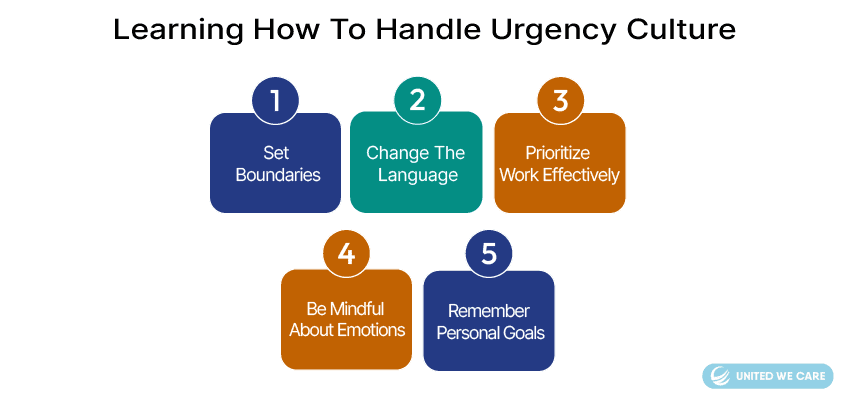Introduction
Have you ever wondered, when you look at people rushing to work, what is the rush? Where are we going? And that too with so much urgency that we can’t even enjoy the morning coffee without being on the go! We are all living with a sense of urgency these days, and this has become so common that it has given rise to the concept of “Urgency Culture.” A culture of urgency can have a negative impact on your physical, emotional, and mental health. It is important to understand what causes urgency, culture, its effects, and ways to deal with it in order to survive it. This article is going to help you do just that.
Understanding Urgency Culture
“You have to finish this”; “This is super urgent”; “We are on a strict deadline”; and other such phrases are commonly heard these days in workplaces. While the phrases are not wrong, some organizations have a habit of using these terms for all their tasks and then rewarding those who run or overwork to finish and reach unrealistic expectations. This is urgency culture.
Defined simply, urgency culture is when individuals feel pressured to constantly be on the go, quickly accomplish their tasks, and be always available for work demands [1] [2]. Usually, three things are there [2]:
- An obsession with being productive
- A need for immediate satisfaction of desires
- Fear of missing out (FOMO) [2].
These days, people in workplaces are encouraged to treat every task as equally important, which leads to a lack of prioritization and a false urgency. Eventually, overwork leads to stress and burnout, and resentment sets in.
If you have experienced an urgency culture, you might have noticed that you rarely complete work during regular hours and end up playing catch-up outside work time. Ultimately, this leads to chronic stress and negative mental and physical health [1].
This culture is not only restricted to professional life; it tends to seep into your relationships as well. With the constant availability of instant messaging, social media, and mobile connectivity, your partner might expect you to be responsive and available 24/7. Such expectations end up becoming overwhelming and might make you feel guilty as well as anxious [3].
Must Read Employee Appreciation
Reasons and Psychology Behind Urgency Culture
From modern-day advancements to human psychology, many factors contribute to the formation of urgency culture. Some of the reasons are [1] [2] [4] [5]:

- Hustle Culture and Societal Expectations: Our society glorifies being busy and applauds you for being constantly productive. With most influencers urging you to “hustle harder” and “retire by 30”, you can easily fall prey to the belief that being busy means success.
- Productivity equals overwork: Especilly in corporate culture, employers equate urgency with productivity. Thus, many managers end up considering highly productive overworking individuals as those who have high performance.
- Advancement in Technology: Technological advancements such as the internet, smartphones, AI, and social media have brought all the world’s information to your fingertips. This ease of accessing information and the ability to communicate instantly has created a sense of immediacy where any delays are unacceptable.
- Fear of Missing Out: When social media constantly exposes you to other people’s achievements and lifestyles, it is difficult to be alien to the feeling of FOMO.
- Competition and Addiction to the Rush: The world is a competitive place. In this competition driven world, the very human desire to stay ahead of peers creates a sense of urgency. Moreover, there is a rush that you tend to feel when you complete a task. This reinforces the cycle of urgency.
- Absence of Work-Life Balance: The boundaries between work and personal life have become a blur in the recent past. The COVID-19 pandemic made this worse by perpetuatingwork-from-homee culture. Now, all of us feel the need to be available and responsive at all times, even at home. In other words, we are constantly working and never resting, always fulfilling urgent tasks and never pausing to enjoy the mundane ones.
- Misunderstanding of Urgency: Urgency in the workplace can be beneficial in bringing change and motivating employees; many companies misunderstand what it is and how to use it. It is because of this that they end up creating a stressful environment for employees.
Effects of Urgency Culture
While urgency culture may be a recent phenomenon, many researchers have studied time urgency and its effects on people. Most of these studies have shown that high feelings of urgency in time lead to poorer psychological and physical outcomes for a person [6]. In an urgency culture, time urgency is the central feature. Thus, some effects associated with this culture are [2] [4] [7] [8]:
- Increased Stress and Burnout: People feel constant pressure to perform and meet deadlines in such a culture. This can lead to chronic stress, burnout, physical problems, depression, and anxiety.
- Poor Decision-Making and Increased Rework: The urgency-driven mindset often leads to hasty decision-making. When people make decisions without proper evaluation or consideration, they can make many errors and require rework. Thus, this culture ultimately reduces overall productivity.
- Diminished Creativity and Focus: When you prioritize quantity over quality, your work is rushed and superficial. Very little space is present for creativity and focus when you have to jump from one task to another constantly.
- Loss of Enjoyment: When you engage in activities solely for the sake of crossing them off a to-do list, it diminishes the pleasure derived from them. Hobbies and leisure time also become mere tasks to complete, and you remain constantly dissatisfied.
Additionally, this constant busyness can take a toll on personal relationships. Urgency culture can make you neglect quality time with your loved ones. Eventually, it can lead to feelings of detachment and strained connections.
Learning How to Handle Urgency Culture
Managing Urgency Culture requires a conscious effort to establish a healthier approach to life and work. Here are some practical tips [8] [9] [10] [11]:

- Set Boundaries: You need to start by setting boundaries around your personal and professional availability. Remember, you can always refuse extra tasks or unrealistic demands, and if the culture around you does not respect that, you might want to consider changing your environment.
- Change the Language: This is for both leaders and employees of a company. If you are frequently using words like “immediately,” “urgent,” and “extremely high priority,” you are communicating urgency to yourself and others. Trying to use words where the deadline is clear and a space to negotiate or talk is present can be super helpful to avoid urgency. For example, “Can we do this task by Tuesday morning?” would not create undue pressure and would also allow the other to counter if they have an issue.
- Prioritize work Effectively: Sometimes, it is important first to plan what is urgent and what is not. In other words, prioritizing work according to how urgent it actually is. One brilliant way to do this is to use the Eisenhower Matrix, where tasks are categorized based on urgency and importance. Once you are done with your prioritizing, you can clearly see what you can delay, what you can delegate, and what you need to finish immediately.
- Be Mindful of Emotions: Culture is not always wrong because sometimes, urgency comes from within. If you have higher anxiety or usually feel overwhelmed with work, or have been experiencing burnout, there could be an internal sense of emergency as well. You can notice this by practicing mindfulness and recognizing your own thoughts and patterns. One easy way you can practice this pause is by setting 2-3 reminders for a two-minute mindfulness break throughout the day.
- Remember Personal Goals: These days, urgency culture is so widespread that it is easy to fall prey to this false sense of urgency. If you have realized that you might be in such a place, it is time to reflect on what your higher goal is. When you determine what truly matters to you, you will be able to make a decision on how you wish to tackle the urgency issue in your life, be it leaving your job, taking a break, organizing better, or just building more resilience, the answer will be clear when you figure out what aligns with your goals and values.
Read More About Group Therapy
Conclusion
We began with some questions that talked about where everyone is rushing to, and the answer might have become clear by now: nowhere; it’s just that everything feels urgent these days. It is easy to fall into the trap of urgency culture, and if you have, don’t worry; you are not alone, and this is not your fault. But you need to remember that you have the power to resist its negative influences. When you become aware of its causes and impacts, you can find strategies to manage the issues and begin your journey toward peace.
If you are a person or an organization struggling with Urgency Culture, contact the experts at United We Care. Our team is ready to help your organization tackle this problem and promote the well-being of your employees.
References
- S. Young, “Is false urgency killing your culture? ,” LinkedIn, https://www.linkedin.com/pulse/false-urgency-killing-your-culture-samantha-young (accessed Jul. 14, 2023).
- E. Montague, “Urgency culture is hurting your business – here’s why.,” LinkedIn, https://www.linkedin.com/pulse/urgency-culture-hurting-your-business-heres-why-emily-montague (accessed Jul. 14, 2023).
- “What is ‘urgency culture’ in relationships, and why is it important to break it? Read for a good ‘mental health,’” Free Press Journal, https://www.freepressjournal.in/lifestyle/what-is-urgency-culture-in-relationships-and-why-it-is-important-to-break-it-read-for-a-good-mental-health (accessed Jul. 14, 2023).
- D. Ganguly, “Urgency culture at work: That task may not be as urgent as you are forced to think it is – times of India,” The Times of India, https://timesofindia.indiatimes.com/life-style/relationships/work/urgency-culture-at-work-that-task-may-not-be-as-urgent-as-you-are-forced-to-think-it-is/articleshow/92879184.cms (accessed Jul. 14, 2023).
- T. Fredberg and J. E. Pregmark, “Organizational transformation: Handling the double-edged sword of urgency,” Long Range Planning, vol. 55, no. 2, p. 102091, 2022. doi:10.1016/j.lrp.2021.102091
- S. S. Kohler, “Time urgency: Psychophysiological correlates,” ProQuest, 1991. Accessed: Jul. 14, 2023. [Online]. Available: https://www.proquest.com/openview/bf96aaa64c0ce2b4e416cbc0eaa62d83/1?pq-origsite=gscholar&cbl=18750&diss=y
- J. Hilton, “The negative impact of an urgent culture,” HRD Australia, https://www.hcamag.com/au/specialisation/leadership/the-negative-impact-of-an-urgent-culture/229385 (accessed Jul. 14, 2023).
- M. Morales , “Urgency culture: On the go or on the nerve?,” Resources To Recover, https://www.rtor.org/2023/01/24/urgency-culture-on-the-go-or-on-the-nerve/ (accessed Jul. 14, 2023).
- “The problem with an always-urgent workplace culture,” Thomasnet® – Product Sourcing and Supplier Discovery Platform – Find North American Manufacturers, Suppliers and Industrial Companies, https://www.thomasnet.com/insights/the-problem-with-an-always-urgent-workplace-culture/ (accessed Jul. 14, 2023).
- G. Razzetti, “The problem with an always urgent workplace culture ,” RSS, https://www.fearlessculture.design/blog-posts/the-problem-with-an-always-urgent-workplace-culture (accessed Jul. 14, 2023).
- J. Estrada, “The therapist-approved way to protect your mental health from urgency culture,” The Zoe Report, https://www.thezoereport.com/wellness/how-to-deal-with-urgency-culture (accessed Jul. 14, 2023).









